Portugal in the First World War
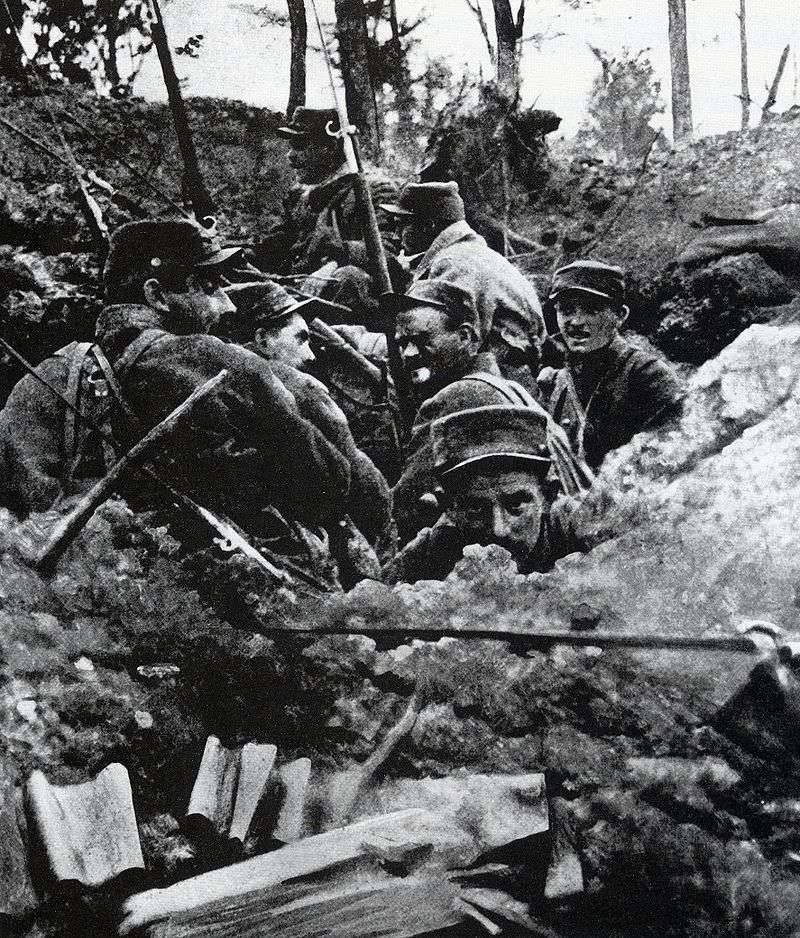
100 years ago, 9 March 1916, Germany declared war on Portugal. This happened when the Portuguese, at the request of Britain, seized German ships that were in the ports of Portuguese East Africa (present-day Mozambique). On March 15, a similar “exchange of courtesies” took place at Lisbon with Vienna.
Although before Portugal formally and remained neutral, de facto the first fighting between the Germans and the Portuguese began in October 1914, when German troops invaded from the colony of South-West Africa in Portuguese Angola and took control of part of its districts. Germans also attacked Portuguese border posts in eastern Africa. They explained their claims by the fact that the Portuguese had long-standing allied agreements with the British Empire. The Portuguese fought back, but they were afraid to openly quarrel with Germany. Lisbon has transferred several thousand soldiers to Africa. This is a typical border war, which received official status only after a year and a half.
It must be said that between Germany and Portugal there have long been tensions related to border issues in the colonies. So, in 1886, Germany and Portugal agreed to draw the border between German East Africa (which included the present mainland of Tanzania) and Portuguese East Africa (now Mozambique) along the River Ruvume. But in 1892, Germany announced that Portugal had no rights in the territory north of Cape Cabo Delgado (approximately 10 km south of the mouth of the Ruvuma). In 1894, the German fleet captured Kiongu. This is a small area in the extreme north-east of Mozambique (on the border with Tanzania), on the shores of the Indian Ocean, south of the River Ruvuma, around the village-port of Kionga. German troops occupied the neighborhood Kiongi area 395 square. km
By the beginning of World War I, Portugal was one of the most underdeveloped agrarian European countries. Accordingly, its armed forces had a minimum combat potential. The country had no funds for a strong army and navy. In memory of the former powerful colonial empire, Portugal (a republic since 1910) inherited significantly reduced colonial possessions - Mozambique, Angola and Guinea-Bissau in Africa, small territories in India, Oceania, and islands in the Pacific and Indian oceans. In addition, Britain, which claims to be a world leader, trampled the finances and economy of Portugal, and began to determine its policy.
With the beginning of the war, the political forces of Portugal were divided. The Democratic Party advocated the entry of Portugal into this conflict. The most important was the argument that it was the only way to protect the colonies, which were an important source of income and the last belonging to former greatness. So, in Portugal it became known that in 1913 it almost came to the signing of a secret agreement between England and Germany on the sharing of the Portuguese overseas possessions in half by these two great powers. The war temporarily prevented the implementation of this plan, but the winner, whoever he became, could get everything. In addition to this argument, they talked about the need to embed the country in a pan-European context. They say that Portugal should not remain aloof from the general war and participation in the conflict will raise the status of the country. At the same time, the left supported the support of the Entente powers, who personify freedom, and the right - for Germany, which was identified with force and order.
The Democratic Party had strong positions, so in the end Portugal decided to go to war. At the same time, the British solved their problems. London needed to find additional contingents of "cannon fodder" for the French theater and the war in Africa. The Portuguese colonies of Angola and Mozambique very conveniently flanked the German possessions in South-West and South-East Africa. At the beginning of the war, several dozen German and Austro-Hungarian merchant ships, caught in the sea, took refuge at the mouth of the Tagus River - in a neutral port, where they hoped to avoid capture by the British squadron. However, London wanted to get these ships "with cargo, crew and all the equipment", and the British "asked" Lisbon to seize them, then to transfer to their use. So the Portuguese did, because they could not refuse England. In response, the German Empire declared war on Portugal.
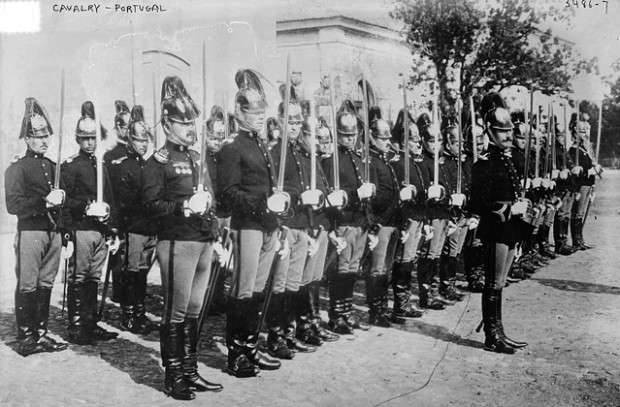
Portuguese guardsmen
15 July 1916 received a formal request for the participation of Portuguese troops in the European massacre from Britain. 22 July was followed by an answer: Portugal pledged to form a Portuguese Expeditionary Corps for the front (port Exp Corpotionário Português, CEP) consisting of three infantry divisions and an independent artillery compound. The troops were partly staffed with military personnel, partly with reservists who were called up. The first commander of the corps was appointed General José Norton de Matos. He was a rather mild manpower for a military man, who genuinely loved his soldiers and cared for them, a good military administrator, but as a commander often experienced a “lack of resolve”.
7 August the Portuguese Parliament approved the country's participation in the war in accordance with the proposal of the British government. The expeditionary forces of Portugal included 55 thousand soldiers and 1000 gunners, who were sent to France in batches of 4-5 thousand people each month. In fact, only the first two divisions reached France, since then the main efforts of the Allies were directed to the transportation of American troops. In addition, significant forces were sent to the African colonies - Angola and Mozambique, where direct hostilities with the Germans also continued until the end of the war.
In December 1916, the French asked Lisbon to send gunners to build heavy artillery batteries from 20 to 30. In January, the 1917 of the year was formed by the Independent Corps of Heavy Artillery (port. Corpo de Artilharia Pesada Independente, CAPI) as part of the 25 batteries. In February 1917, the first Portuguese contingent reached the French port of Brest. From there, soldiers were loaded into trains that carried them to front-line base camps. The path to the front ended on foot march directly to the position. According to the agreement with Great Britain on the participation of Portugal on the Western Front, the troops of the Portuguese corps were integrated into the British Expeditionary Force. The Portuguese contingent became part of the 1 of the English army.
Mobilization and military training was in full swing throughout Portugal. The basis of the expeditionary corps consisted of ordinary peasants, who were torn away from their difficult labor. Initially, for many of the Portuguese military, the upcoming “trip to France” seemed almost entertainment. Portugal entered the first European war (not counting internal conflicts) since the wars of Napoleon. About the devilish meat grinder, which has already claimed hundreds of thousands of lives, only indistinct scraps of news reached the quiet and provincial Portugal. We must pay tribute to the British, though they dragged Portugal into the war, but honestly provided new allies with modern equipment and weapons. Thus, in the field camps, the Portuguese mastered such novelties as the Lewis machine guns, which the poor army of Portugal could only dream of earlier. The fighting showed that the Portuguese are brave soldiers and good machine gunners.
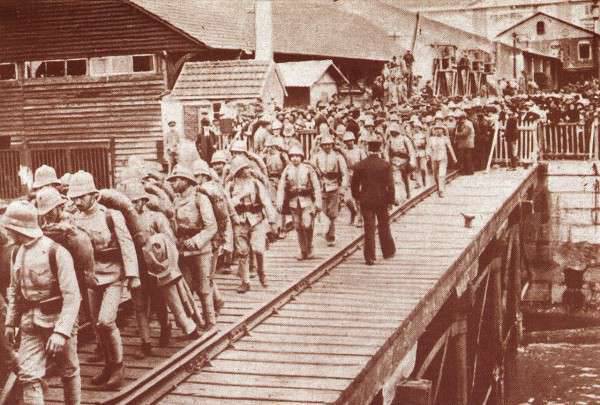
Portuguese troops land in Angola
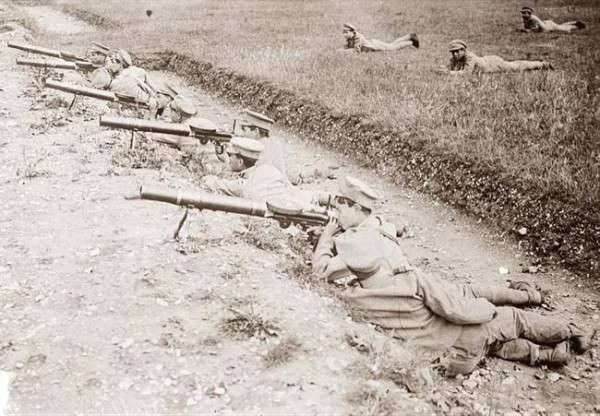
Portuguese soldiers master Lewis machine guns
Landing in France
For the first time, Portuguese soldiers entered 4 on April 1917, and at the same time the first one was hit by a bullet from a German sniper. Private Antonio Gonçalves Kurado (by the way, not a peasant, but a student volunteer) became the first Portuguese killed on the French front. By the end of May, the first Portuguese brigade occupied its sector at the front. 16 June 2-I infantry brigade occupied another sector in the battlefield. July 10 The 1-Division CEP took control of their sectors and took command of British General Richard Hacking. Part of the Portuguese division's 2 began to arrive. In September, the 4 Brigade from the 2 Division arrived at the front.
In the autumn of 1917, the number of Portuguese troops on the French front reached almost 60 thousand. The Portuguese corps consisted of: two full-fledged infantry divisions, each with three brigades (in the brigade - four infantry battalions and an 75-mm mortar / mortar battery); plus parts of divisional subordination (the same in both divisions) - three artillery battalions, three machine-gun battalions, three 152-mm mortar batteries, three engineering and sapper companies, a heavy mortar battery, a cavalry squadron, a telegraph company and a car battalion. A corps battalion, an engineering battalion and rear services were located in corps subordination. The Portuguese railway battalion and artillery compound of ten heavy howitzer batteries were transferred to the British command. On November 5, the command of the Portuguese Corps reported on full acceptance of responsibility for the "Portuguese Sector" of the front - the 18-kilometer (6 km. More) than the first line of defense and three echelons of defense.
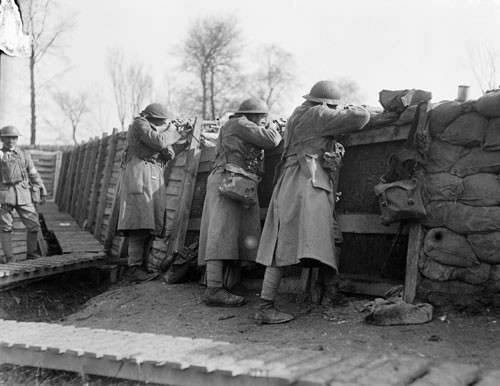
In positions
At first, the arrival at the front of the “toy army” caused a typically Prussian arrogant contempt among the opposing Portuguese forces. However, all attempts to knock down the Portuguese from positions in June and July consistently ended with the attack of the German troops were repulsed. Moreover, the Portuguese, who were still drawn into the realities of the new war, went on the attack (like the French in 1914). Therefore, the Germans, appreciating the courage and resilience of the new enemy, in August-September 1917 were already serious about him and attacked “in the strict rules of art” - with strong artillery preparation and attack troops going on the point of impact. However, the Portuguese soldiers withstood this onslaught.
In the future, the combat effectiveness of the Portuguese troops, who were involved in the "trench life" fell. The Portuguese, who grew up in a warm seaside country, had a chance to experience all the trenching life on the Western Front. By the spring of 1918, losses in the personnel of the Portuguese corps reached 18% - the vast majority of them from colds and frostbite. The soldiers did not even have the simplest skills to prevent hypothermia in the field. As a result, the morale of the Portuguese soldiers fell. There were numerous cases of disobedience to orders, when soldiers refused to leave dugouts on duty, and even entire units refused to return from a short rest under the roof to the front line. In this case, the Portuguese officers tried to cover their own. However, in spite of discouragement, the Portuguese managed to hold their positions during the March German offensive. The Portuguese have tried to show that they are not worse than the others.
By the spring revealed another problem. The Portuguese, unlike the French and the British, had nothing to rely on vacation from a position. Replacing or recruiting from Portugal did not arrive, although the 3-I infantry division was already ready there. With the entry into the US war, all the transports were engaged in transporting American troops, and the Portuguese were virtually forgotten. By April, the deplorable state of the Portuguese troops led the British command to send both divisions to the reserve. First, the 1 Division was sent to the rear. The 2 Division entered the 11 British Corps. The corps commander, General Richard Hacking, immediately personally inspected the foreign troops assigned to him and came to an insult to the Portuguese, but an objective conclusion: “These tatters are no good! They need to be changed. ” However, the German attacks forced the Allies to abandon these plans.
In April, the battle began on the river Fox. Before 1700, the German guns attacked the positions of the 11 corps. The Portuguese could only fire with 88 guns. German artillery plowed positions 2-th division. Then 8 of the German divisions went for a breakthrough. In some places, the Germans easily crossed the line of defense, in others the surviving Portuguese desperately fought back. But in general, this picture did not change. In a few hours of battle, the Portuguese division was destroyed: 327 officers and 7098 soldiers were killed, wounded and taken prisoner, which was about 35% of the total strength of the Portuguese corps. For the first time, demoralized Portuguese soldiers surrendered en masse. True, blaming the Portuguese soldiers is not worth it. This is the fault of the high command, which in time did not change the troops brought to the extreme degree of fatigue and despair.
The survivors were sent to the reserve, or integrated into the British forces. In July, the CNE 1 Division became part of the British 5 Army, commanded by William Bidwood. In August, an experienced general, Tomas Garcia Rosadu, took over the Portuguese forces. The remainder of the war the Portuguese spent in the rear. The British command applied them to civil engineering and the protection of communications.
In September, General Rosadou energetically set about re-forming the Portuguese corps in order to regain his combat capability. Of the most combat-ready units, he planned to create three infantry brigades (three battalions each). In October 1918, the first four battalions were formed. Portuguese troops took part in the final stage of the decisive “One-Day Offensive” of the troops of the Entente, which forced the German Empire to surrender. For the last time in World War I, the Portuguese fought 11 on November 1918 in Belgium, attacking the retreating German units while crossing the Scheldt River.
The war led to the appearance of heroes. Newspapers of distant Lisbon enthusiastically talked about young lieutenants, who raised the soldiers in counterattacks, captured prisoners. Ambitious and courageous young officers during this period were able to become heroes for their soldiers, to the extent that the first line of defense in the Portuguese trench lingo became known as the position of junior lieutenants. And during the Battle of Lys, Private Anibal Milyash (later called Soldado Milhões or “Soldier Standing a Million Others”), one with a machine gun, covered the retreating colleagues, which allowed them to escape from the attack and regroup. German soldiers seemed to be dealing with a whole platoon. When the ammunition ended, he left the battlefield, destroying several Germans on motorcycles along the way. After that, he wandered, losing his part, and was found only when he saved a Scottish major from the swamp, who led him to the Allied battle camp.
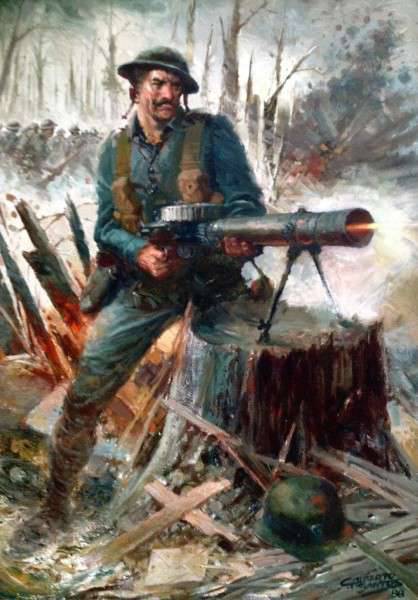
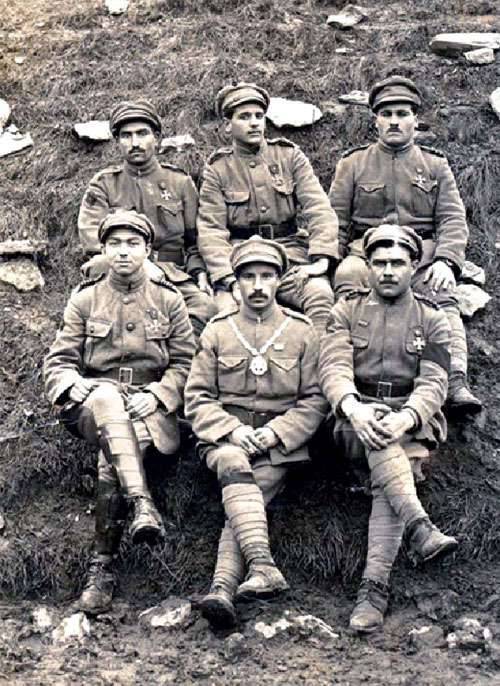
Anibal Millais (middle front row) among other Portuguese soldiers who were awarded for the Battle of Fox; his award is the high Portuguese Order of the Tower and the Sword (he was also honored by the French Legion of Honor)
The losses of Portugal in the war amounted to 8145 killed, 13751 wounded, 12318 captured or missing. German submarines sank 80 Portuguese ships. The profit from the war was small. The territorial acquisition of Portugal at the end of the war in 1919 was only a small piece of German East Africa - the port of Kyonga.
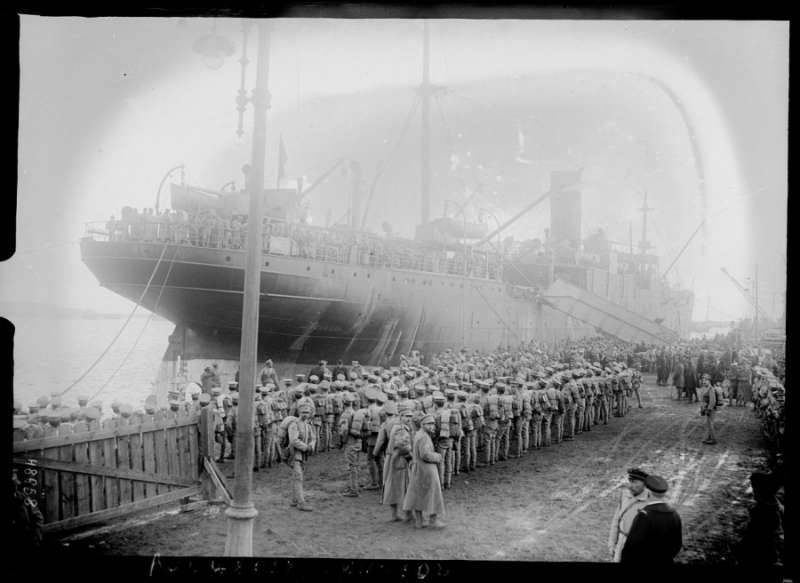
Information